The natural environment, choice of the right field, locally adaptable varieties, and application of proper cultivation techniques are all factors affecting the productivity of the Olive Garden. Nothing is more calm, beneficial, and peaceful than growing Olive trees. You can plant it in a garden or proper container. A field with a slightly lower slope, ending up on a smooth surface, where cold currents can escape easily, is usually a suitable place for installing an Olive Garden.
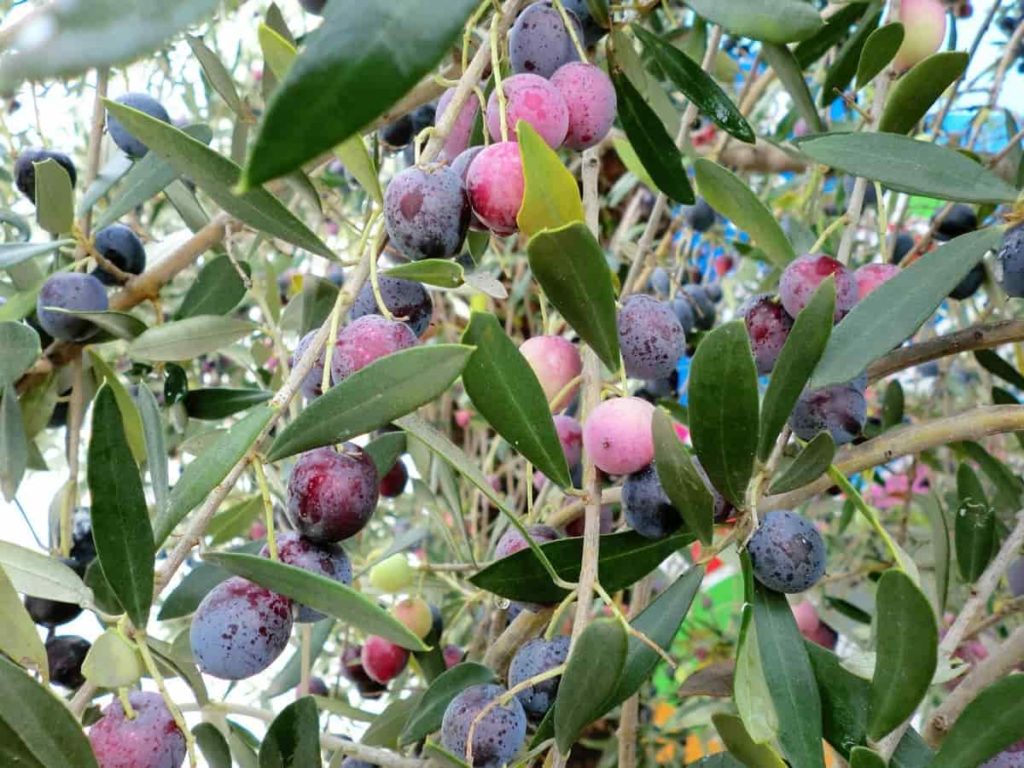
The Olive tree needs enough sunlight to produce good products and hates the excess moisture of the soil. Therefore, the Olive farmer should choose well-drained soil where rainwater cannot easily stagnate. The best soil type for Olive trees is loamy soil, which will encourage the growth of these evergreen perennials. The tree’s roots need aeration, and clay soil is not following them. At the same time, sandy soil does not catch water and is nutritionally poor.
How to prepare the soil for Olive trees/plants
Soil pH for Olive
Before applying any amendments, you will check the physical properties of the soil (structure, soil sustainability, etc.) and the level of nutrients available. These figures affect various other variables that ultimately affect production. Two very interesting parameters are soil pH and calcium content, as both affect the absorption of certain nutrients supplied by fertilizer.
The best pH for an Olive tree is about 6.5, but the average Olive tree can produce fruit in soil with a pH of 5.5 to 8. Finely ground limestone (calcium carbonate) or dolomite (calcium and magnesium) is the most common material for liming soil and is the most frugal way to reduce soil acidity. Phosphorus on acid soil is maintained in less available forms than in slightly acid and neutral soil.
Preparation of soil for growing Olive in pots
These trees are well suited to grow in rocky soil with less than perfect nutrition. To stimulate this in the container garden, start with an average organic potting soil and then modify with extra perlite, or even better, amend with one or two small lava rocks. It spreads nutrition and increases drainage capabilities.
Olives are addicted to rocky soils that are not so nutritious, so it doesn’t matter much if the soil is not too fertile. However, the most important aspect of potting soil selection should be drainage. You can use perlite or lava rocks in potting mix to improve drainage.
In case you missed it: How to Prepare the Soil for Banana Plants: Best Soil Mix, pH, Compost, and Recipe

Preparation of soil for growing Olive on grounds
Olive trees are not heavy feeders; over fertile soil can harm fruit production. However, trees grown in poor, mineral-deficient soils can benefit from regular feeding with a balanced fertilizer with at least 10% nitrogen content. When planning to plant Olive trees, two of the most important factors are sunlight and garden soil. Dig a hole in the ground equal to the current pot of Olive trees.
Do not add compost, organic matter, or other potting soil to the tree. A young Olive tree needs the soil climate it will inhabit, so you should neither change it nor help fill around the root ball using natural soil from the same area. Olive trees need enough moisture to thrive but don’t like to be kept in wet soil. If your soil is not drained well, you should adapt the soil to increase its drainage capacity.
How to grow Olive in clay soil
Olives will grow in a wide range of soils as long as good drainage is provided. Heavy clay soil needs to be avoided. Olives are most tolerant of fruit trees for the salinity of the soil. Olive trees grow incredibly well in poor and even rocky soils. Use a slow-release fertilizer when planting if your soil contains high clay content. Where possible, avoid planting fruit trees in heavy, pure clay soil.
It is worth remembering that Olive trees are very adaptable and resistant. Surprisingly, they can be well found even where the soil is nutritionally poor, but using the right food will give your Olive tree the nutrition it needs to thrive. You can plant an Olive tree in a raised bed if your garden has clay soil to help the aeration. Check the soil before planting the tree and bring the pH to about 7 or 8. Also, remember that the tree’s roots are shallow and will get nutrition near the surface.
In case you missed it: Best Fertilizer for Orange Trees: Organic, NPK Ratio, Management, Schedule, How and When to Apply
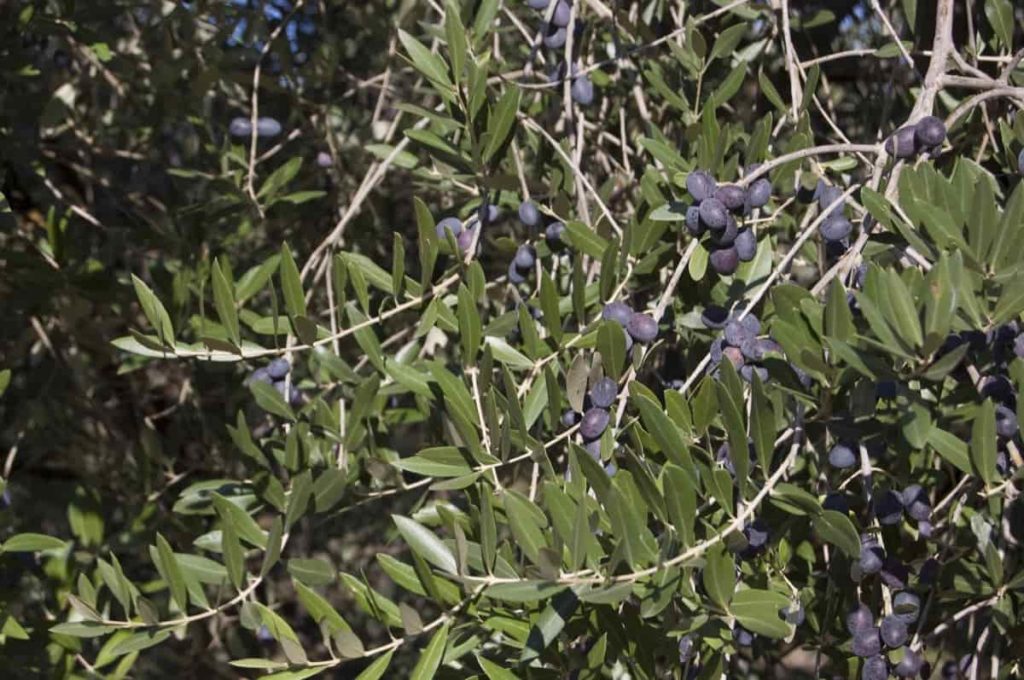
Soil composting for Olive
Compost and aged animal manure decompose for an extended time and help amend the soil. You can fertilize Olive trees every other year with organic manure. The application of green manure in Olive gardens has become popular in recent years. It begins with sowing an annual or chronic plant (alpha, forage bean) in an Olive Garden immediately after harvesting. Before fully opening pods, you can add them to the soil by plowing.
Furthermore, it increases the ability of water to absorb and maintain soil moisture and contributes to the management of harmful perennial and resistant weeds. Legumes include Vetch, Reptile clover, Lupine, Beans, and Peas. These legume crops enrich the soil with nitrogen and are widely used in green Olive manure. Similarly, farmers can use cereals like Oats and Barley in part. These plants absorb significant amounts of nutrients adding them to the soil provides easily available nutrients for our plants.
Land preparation for Olive
To prepare the garden, it needs to clean weeds, if there are any, and trees within the garden cutdown allow full entry of sunlight. To avoid the risk of various fungi attacks on our Olive garden, it is important to keep the soil fallow for three or four years before planting our young Olive trees. You can plant a grass crop for a few years and then clean it. The latter must be leveled first to install an irrigation Olive garden on uneven ground.
The leveling occurs before deep plowing. The deep plowing of 20 inches is primarily aimed at destroying perennial weeds and soil fluffing, which contribute to the better development of the tree root system. However, it is good to do a basic soil analysis before plowing. The results depend on determining the type and quantity of basic chemical fertilizers required to improve the soil.
When the work is complete, get the Olive seeds and plant. Dig holes in the garden, depending on the number of trees you want to grow. Some varieties are not pollinated, so you need to enhance their pollinated variety with them. The pollinated tree helps produce more pollinated species than they would normally after making a hole where to plant trees, sow seeds, and cover the holes with sand.
Soil mix for Olive trees
Olive trees’ best potting soil must be rich in nutrients, good drainage, and a neutral pH. You should use the best soil to help your plant withstand any environment. Besides being rich in nutrients, the soil should also be drained thoroughly for your tree to flourish. The best soil for Olive trees is a well-draining potting mix. There is plenty of room between particles in the soil to ensure that it never gets soggy.
In case you missed it: 24 Common Lemon Tree Problems: How to Fix Them, Solutions, and Treatment
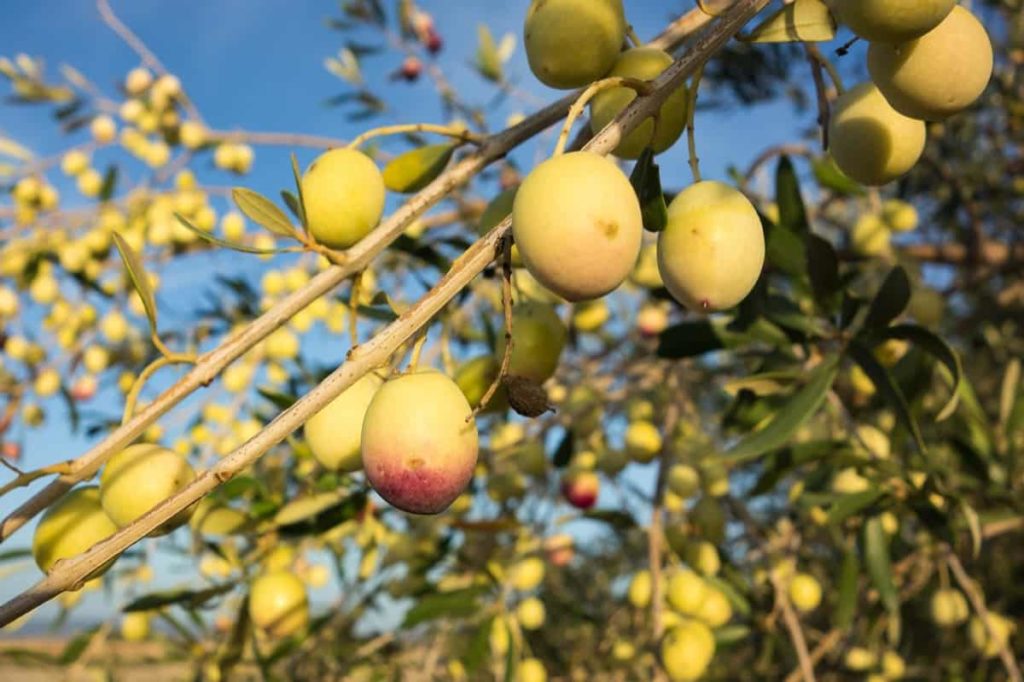
You can add some organic matter when growing Olive trees in pots and indoors. The compound should be equal parts sand, silt, and clay. The cactus soil is ideal for Olive trees, but any sand or granny mixture will easily work. Olive trees do not tolerate soggy or slow-draining soil. Mixing perlite, bark chips, or small gravel can improve drainage and aeration.
Soil recipe for Olive trees
The best recipe for Olive trees in pots is a well-drained potting mix. Such potting soil is a mixture of equal parts of peat, sand, perlite or bark, and organic matter. At the same time, it can be a mixture of sand and clay.
Natural soil amendments for Olive
You can also make your compost to give your plant the nutrients needed to thrive. Just stir in the old leaves and garden trimmings with kitchen scrap and manure. Then mix the two materials into a thin layer of soil before covering them with at least four inches more. When the plant is transplanted into the garden, it does not immediately need fertilizer or manure. It must be left alone to master the soil without any fertilizer or manure. After six months or a year, soil type depends on nutrients, and you can apply fertilizer or manure.
It requires nitrogen, and the compost of some organic fertilizers can provide it with it. Mulch is a healthy process on Olive plants. The tree requires this process when it is small or transplanted first. This is because it protects the roots and stem of the young plant from pests and very hot sunlight or weather conditions and helps maintain water in the ground and cool it, especially in dry weather. Green leaves are the only fertilizer (compost) applied to this plant.
What to do with soil when growing Olive
Companion plants are an integral part of successful gardening. Marigolds are a great combination for Olive trees because they are easily adaptable with favorable, low maintenance, and hot summers. Moreover, the smell of the Marigold removes so many unwanted insects that they protect and reward with beautiful yellow or orange flowers. You can elevate your garden beauty with Marigold flowers growing under Olive trees, and it helps keep your tree free from harmful insects due to their insect protection properties.
In case you missed it: How to Prepare the Soil for Pomegranate Plants/Trees: Best Soil Mixture, Ph, and Compost
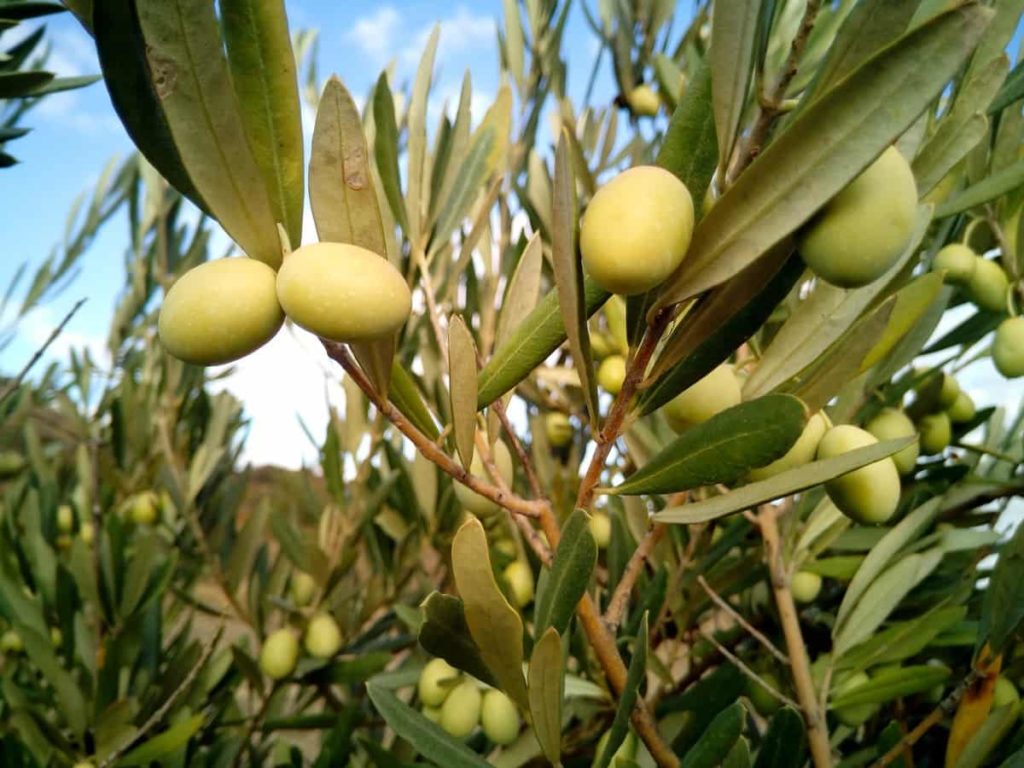
Petunia is one of the most popular companion plants for Olive trees. The Petunias come in different colors to enrich and decorate the atmosphere around your home. Borage helps prevent Olive trees from pests and attracts pollinated flies. Nasturtium plants are also less caring, easy to grow, and a great companion for Olive trees. Moreover, they are editable, and you can use them to lure the aphids away from your Olive tree growing with them.
Lemon balm is a perennial herb that attracts flies. Also, the Lemon balm has a pleasant lemon smell and small white flowers that attract tachinid flies and wasps, killing harmful caterpillars from your Olive trees. Parsley is a perfect companion plant for Olive trees, and it makes a beautiful weed plant with curly leaves that invite good flies and wasps, killing predators harmful to your Olive trees and other plants.
Peas are beautiful plants that release nitrogen into the ground, benefiting hungry Olive trees. Peas are also much easier to take care of and grow, and you can grow Peas everywhere for their edible seeds and elevate the charm of your garden. Lavender is one of the most grown weed plants with an Olive tree because of its fragrant aroma that helps attract pollination for your plants.
Lavender is a great and beautiful weed to create different types in your backyard and create a magical landscape. Also, Lavender is one of the best companion plants for Olive trees, which adds a great to your landscape and has many dishes. Thyme is also easy to grow and thrives well under Olive trees, making it the best companion plant for Olive trees.
Bulbs are annual plants that bloom during spring and summer, while in winter, they become inactive. Adding bulbs under Olive trees will add spectacular color to your garden during spring or summer. Succulents are surprisingly low maintenance and flexible plants, requiring little to no care. Succulents are one of the best companion plants of Olive trees.
In case you missed it: Growing Mango Tree In Backyard – A Beginners Guide
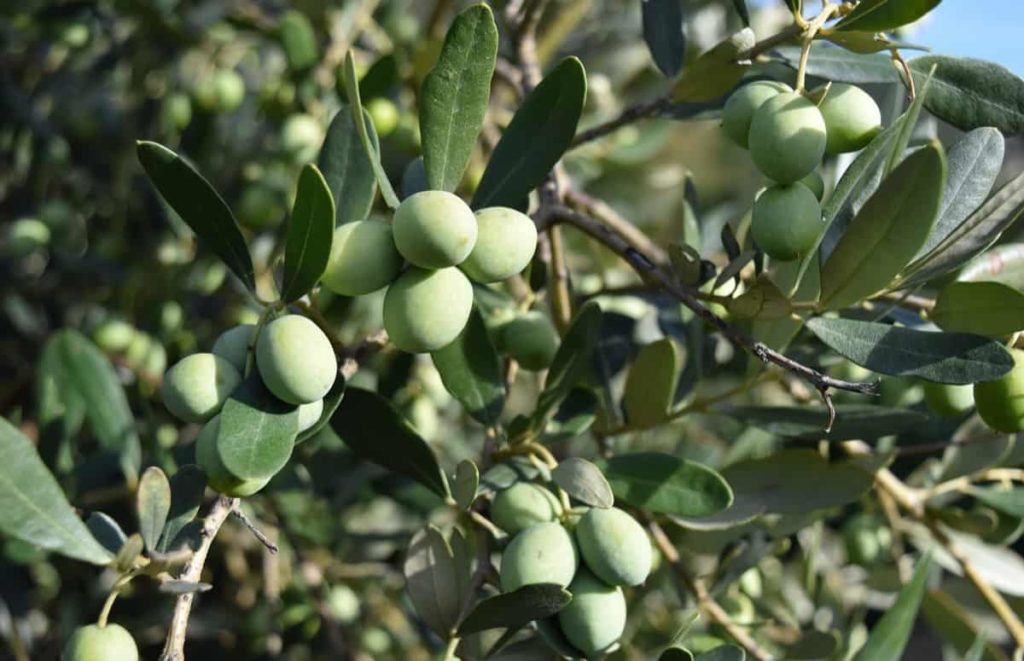
Conclusion
Olive trees grow in many types of soil and climate around the world, but using the best Olive trees helps them reach their full potential and stay consistent. Olive trees are highly forgiving when it comes to soil preparation and planting. However, some suggest using composted manure as a top dressing before planting. Olive tree seeds grow best when soil is well composted from fresh organic matter such as compost or fertilizer. This article will help you get a good yield in the Olive crop by following these steps of soil preparation.
- How to Grow Hibiscus from Flower
- Plantation Ideas for Home Decoration: A Beginners Guide
- Flower Garden Designs and Layouts for Beginners
- Planting and Spacing Techniques in Papaya: A Beginner’s Guide
- Growing Gold: Essential Techniques for Planting Pineapples
- How to Make Kalanchoe Plant Bushy: Home Remedies and Solutions
- 11 Reasons Why Your Gardenia is Not Blooming: Home Remedies and Solutions
- Eco Elegance: The Guide to Designing a Drought-Tolerant Landscape
- Gardening on a Slope: Strategies for Hillside Landscaping
- Nourish and Flourish: Top Organic Mulches for Thriving House Plants
- Everything You Want to Know about Indian Mogra Flower: Discover Uses and Growing
- Green Thumb Success: Expert Tips for Cultivating Greenhouse Pumpkins All Year Round
- Maximize Growth & Flavor: The Ultimate Guide to Companion Planting in Herb Gardens
- How to Control Rhododendron Problems Naturally: Home Remedies and Organic Ways to Fix Them
- Natural Magic: The Remarkable Benefits of Cinnamon for Plants
- Best Steps to Revive Dying Tulip with Natural and Organic Treatment
- 10 Reasons Why Your Angel Trumpet is Not Blooming: Remedies and Treatment
- How to Fix Periwinkle Leaf and Flower-Related Problems: Natural Remedies and Solutions
- How to Fix Zinnias Leaf and Flower Problems: Discover Natural and Home Remedies
- Organic Steps to Induce Lemon Tree Flowers: A Comprehensive Guide
- Bloom Booster: Crafting the Perfect Homemade Bougainvillea Fertilizer
- Optimizing Growth: A Guide to Applying NPK Fertilizer for Potted Plants
- 10 Best Homemade Fertilizers for Rubber Plant: DIY Recipes and Application Method
- How to Boost Female Pumpkin Flowers: Effective Steps for More Flowers and High Yields
- Transform Your Indoor Garden: Top Benefits of Pink Salt for Houseplants
- 10 Best Homemade Fertilizers for Peacock Plants (Calathea): Easy DIY Guide
- Unlock Blooms: 9 Reasons Why Your Potted Chrysanthemum is Not Blooming
- 8 Reasons Why Your Potted Hibiscus is Not Blooming: Fix it with Simple Solutions
- Unlock Blooms: 9 Key Reasons Your Potted Frangipani Won’t Flower
- 10 Reasons Why Is My Ice Plant Not Blooming: Remedies and Treatment
- 10 Reasons Why My Potted Hydrangea Not Blooming: Treatment and Remedies
- 10 Reasons Why is My Wisteria Not Blooming: Remedies and Treatment
- 10 Reasons Why is My Goldfish Plant Not Blooming: Remedies and Treatment
- Maximize Your Space: Ultimate Guide to Balcony Gardening with Grow Bags
- 10 Reasons Why Your Iris is Not Blooming: Remedies and Treatment
- 10 Reasons Why Your Anthurium Plant is Not Blooming: Treatment and Remedies